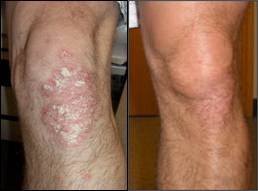 Eczema, also referred to as “atopic dermatitis” is a very common condition affecting all ages and characterized by sensitive skin which becomes easily inflamed, red, scaly and itchy. The word ‘atopic’ means there is a genetic tendency for excess inflammation in the skin resulting in Eczema and a positive sensitivity in the lungs (asthma) and nose causing hay fever. Eczema may be present on the face in infants, on creases and folds in young children, and in localized areas such as hand dermatitis or in more generalized areas on adults.
Eczema, also referred to as “atopic dermatitis” is a very common condition affecting all ages and characterized by sensitive skin which becomes easily inflamed, red, scaly and itchy. The word ‘atopic’ means there is a genetic tendency for excess inflammation in the skin resulting in Eczema and a positive sensitivity in the lungs (asthma) and nose causing hay fever. Eczema may be present on the face in infants, on creases and folds in young children, and in localized areas such as hand dermatitis or in more generalized areas on adults.
Eczema often runs in families with sensitive skin, allergies, asthma or hay fever. Skin irritants may cause flares and a tendency to itch and scratch, which promotes the disease. Eczema is termed the ‘itch that rashes’.
Symptoms:
Red, scaly, crusted, oozing, blistering, brownish plaques on the skin. Chronic areas become thickened due to intractable itching. Areas may become crusted and infected.
Treatments:
Try to avoid any irritants, use cool short baths or showers, mild unscented soap, and frequent moisturization with hypoallergenic creams, lotions and ointments.
Medications may include:
- Topical Steroids: Hydrocortisone, Triamcinolone, Clobetasol (Clobex, Olux)
- Topical Anti-inflammatories: Elidel, Protopic
- Topical Antihistamines: Zonalon cream
- Systemic steroids either by pill (prednisone) or injection
- Topical or oral antibiotics for secondary infection
- Oral antihistamines to suppress itch scratch cycle (Atarax)
